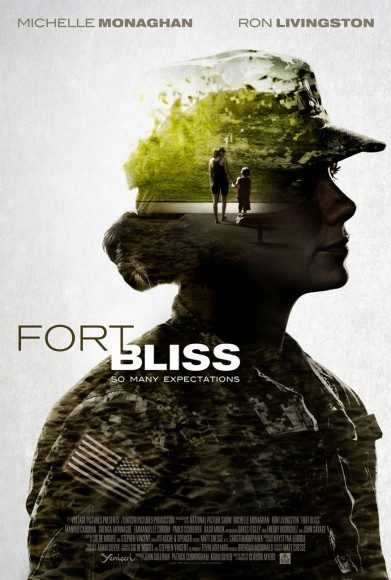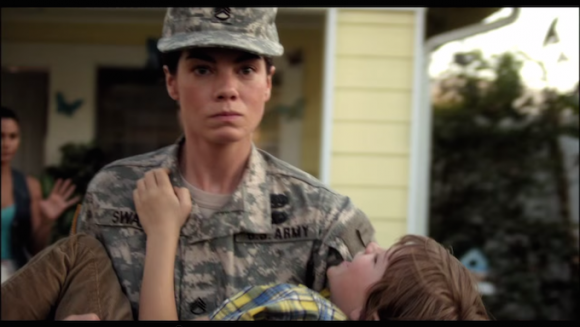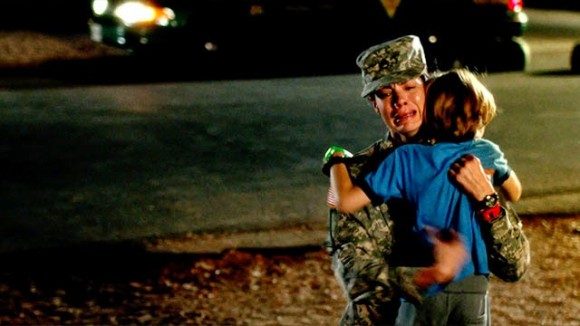The struggles of war don’t end when fighting is over. The veteran’s journey back to a normal life is an arduous one, and it’s a struggle that has formed the foundation of numerous films. Claudia Myers’ third feature, Fort Bliss, changes the formula a bit as it follows a returned army medic and single mother as she attempts to balance her different worlds while rebuilding her relationship with her son.
Michelle Monaghan plays Maggie Swan, who returns home to Fort Bliss, Texas after an extended tour. She is greeted by her ex-husband, Richard (Ron Livingston, Office Space), his new fiancé Alma (Emmanuelle Chriqui, Entourage), and her five-year-old son Paul, who no longer recognizes her. Haunted by memories of war, she struggles to reconnect with Paul and build a new life, even starting a new relationship with a mechanic (Manolo Cardona). Then suddenly her redeployment is moved forward, giving her sixty days. With her ex-husband moving for sole custody of Paul, Maggie is caught between fighting for her family and fighting for her country.
Fort Bliss feels reminiscent of a number of films that came before it. In a way that makes sense. The war film is a genre and Fort Bliss falls firmly into that camp. The problem is that the film does nothing to distinguish itself, seemingly content to follow the well-worn paths of earlier films. This is a shame, since films focusing on military women are few and far between. It also, in many ways, constrains the film’s biggest asset: Michelle Monaghan, who turns in a powerful performance as Maggie Swan.
Maggie Swan is, in almost every way, the archetypal movie war hero. Her military history is comprised of cherry-picked tropes designed to be harrowing. She disobeys orders to save a fellow soldier’s life, experiences guilt after a soldier dies taking her place on a routine checkpoint inspection; she also more singularly experiences a near rape at the hands of a friend. Any one of these experiences is weighty enough to carry the heft of an entire film. Thrown together, they can’t possibly be given enough screen time to be anything other than manipulative distractions from the main plot of a mother reconnecting with her child.
The number of subplots leaves Fort Bliss feeling surprisingly inert. With Maggie being pulled in so many directions, she simply stands still. Any real emotional development is done via montage or off screen. Conflicts arise and are either solved quickly or discarded. The custody battle for Paul feels particularly unceremonious, like it was added simply to heighten tension.
Michelle Monaghan does a commendable job, dragging the film through its swampy script and providing the audience with something to hold on to. She carves out a character that’s both harsh and incredibly tender. Myers’ bravest decision as a director is that she doesn’t ask for Maggie to be likable. Maggie’s proclivity to default towards her military training while parenting a small boy lead to some of the film’s most honest scenes. Ron Livingston and others turn in adequate performances, but with such little to work with, the heft of the film falls onto Monaghan’s back; a burden she proves capable of bearing, but not one that’s necessarily worth the effort.
The Verdict: 2 out of 5
There’s nothing particularly bad about Fort Bliss, but there’s also nothing remarkable about it. It feels derivative of a number of other films that had the good sense to narrow their field of view. Michelle Monaghan’s performance as Maggie is strong, but her talent can’t quite transform this film into something recommendable.




